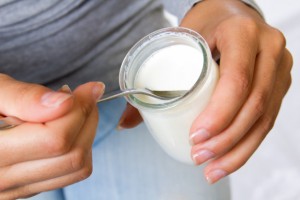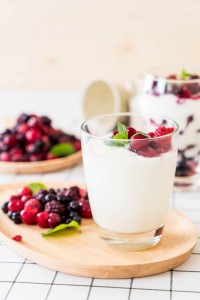
The summer heat is killing! Wish I could eat something that’s chilling and soothing for the stomach, is the thought process that most of us go through. There are lots of summer foods and coolants available but nothing as handy as yoghurt and yes it is also one of the best foods for weight watchers.
Let me share some facts about it!
Personally, Yoghurt has always been a part of my diet. The reason it was added to your meals is to have a healthy gut. As a child, I never understood these nutritional nitty-gritties, it is only when I started studying nutrition, I learnt about the benefits of curd.
Curd or Yoghurt as it is called is it same? While most think it’s the same thing, there is a slight difference between these two.
Yoghurt is a diary product that is created by fermenting milk using bacteria called yoghurt cultures. The bacteria ferment the lactose in the milk causing it to produce lactic acid, which gives yoghurt its tangy and acidic taste. The word ‘yogurt’ is derived from the Turkish word ‘yogurt’ which means “to curdle or coagulated; to thicken”
The curd is another type of dairy product. Curds are made by curdling or coagulating the milk. This can be done by mixing edible acidic substances into the milk, such as lemon juice or vinegar. Introducing this substance to the milk will allow the milk to curdle and separate into two parts. The liquid part is the whey and the milk solids will be the curds. The whey contains the whey proteins of the milk, whereas the curds are the milk proteins or casein
Curd also contains measurable amounts of vitamins A, E and K; thiamine, riboflavin, niacin, pantothenic acid, vitamin B6, folate and vitamin B12. It also contains calcium, iron, magnesium, phosphorus, potassium, sodium, zinc, copper, manganese, fluoride and selenium, as well as saturated fats, and oleic acid, which is a monounsaturated fat.
We all know yoghurt is creamy and delicious. But, beyond that what else do we know about the yoghurt?
- Yoghurt is a great source of high-quality protein, including both casein (80%) and whey (20%). Plain yoghurt made from whole milk contains about 8.5 grams of protein in each cup (245 g).
- Yoghurt contains a family of trans fats called ruminant trans fats or dairy trans fats. Unlike trans fats found in some processed food products, ruminant trans fats are considered to have beneficial health effects. The most abundant ruminant trans fats in yoghurt are vaccine acid and conjugated linoleic acid or CLA. Yoghurt may contain higher amounts of CLA than milk.
- Yoghurt contains small amounts of natural milk sugar (lactose). Many branded Yoghurts are also high in added sugar.
- Yoghurt is an excellent source of several vitamins and minerals, such as vitamin B12, calcium, phosphorus, and riboflavin.
- Yoghurts with live or active cultures contain probiotic bacteria (probiotics) that may improve digestive health.
- Regular consumption can prevent aggravation of certain medical conditions namely High BP, IBS and antibiotic-associated diarrhoea.
- Yoghurt is a rich source of calcium and protein and may reduce the risk of osteoporosis.
In Hindu worship, Yoghurt is added in Panchamrita. Yoghurt symbolizes strength and prosperity.
Did you know that yoghurt can make your workouts less tiring by reducing the muscular stress? If yoghurt is consumed on a daily basis, it facilitates the further functioning of the active T-cells (dominant cells responsible for maintaining the immunity of the body). In case of people who follow a regular workout regime, yogurt soothes the muscle stress and post workout recovery is faster and better.
When you make it at home, it’s safe. But, when you buy from the market…. BE AWARE: Yogurt is often marketed as a healthy food. However, the sugar and flavourings added to many yogurts can make them more like junk food.
Reading the label is the first thing you should do when choosing a yogurt. The nutrition facts and ingredients list can tell you a lot about what’s in your yogurt.
How to choose healthy Yogurt –
1. When possible, choose a yogurt without large amounts of added ingredients. Instead, try to choose a yogurt with few ingredients.
2. Although yogurt already contains some natural sugar in the form of lactose (milk sugar), food companies often add large amounts of simple sugars to make yogurt taste sweeter.
3. Probiotics are the friendly bacteria that turn milk into yogurt. Look for yogurt with the “Live and Active Cultures” seal and avoid yogurts that have been pasteurized after production.

You can also make your own chia seed yogurt to make plain yogurt less tart. And, as a bonus, you’ll get extra protein, fibre and healthy fats with the chia seeds.
Recipe – It is as easy as mixing 2 cups (473 ml) of yogurt with 1.5–2 tablespoons (22–30 ml) of chia seeds and letting it sit overnight in the fridge. This is the best post workout snack.
Well, you can flavour your cuppa of yoghurt with either fruits, berries, banana, chocolate, mint coriander, mango or cinnamon and cumin spice, granola mix.
Is Greek Yoghurt healthy?
Greek yogurt has almost double the protein of regular yogurt. Unless you’re using the non-fat varieties, Greek yogurt has about three times the saturated fat than regular yoghurt. Greek yogurt contains about half the sodium of regular yogurt. Greek yogurt is also an excellent source of iodine. Greek yogurt contains roughly half the carbohydrates of regular yogurt, so It is definitely healthier and keeps your waist in check.
Let’s enjoy the cup of yoghurt in our next meal.




Leave a Reply